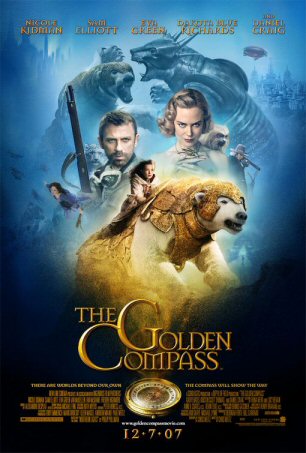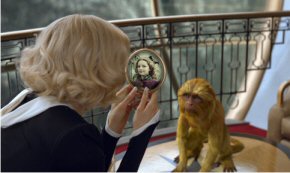|
The
Golden Compass
Let not your faith be shaken by armored
polar bears and talking ferrets. That creepy orange monkey,
though - that might do it.
New Line Cinema has garnered a lot of press
over the last few weeks. Not because they've definitely
hit one out of the ballpark, but because of The Golden
Compass, taken from "avowed atheist" Philip Pullman's
fantasy novel, the first of a cash-cow trilogy. Forget the
alleged attack on religion, however; what really matters
is did they succeed in producing a good film?
Writer/Director Chris Weitz sure gave it
a good try. Remaining almost doggedly faithful to the novel,
Weitz manages to maintain the sweep of its plot. The production
design by Dennis Gassner succeeds in giving the film a sense
of being very other, as The Golden Compass takes
place specifically on a parallel Earth, with the assumption
that our dimension may become a target. Things look familiar
in places but not quite right. Yet it's very natural and
still feels open, not sound-stage bound as too much of Disney's
Narnia work. This really is a believable alien land.
As if the shape-changing animals running
alongside the children wasn't a clue. In this world, humans
have their souls outside their bodies, linked by an invisible
bond, called daemons. They provide conscience, insight and
eternal friendship without making their people look crazy.
Call them totem animals made physical. Though mercurial
at first, once a child hits puberty, his daemon settles
into one animal form, reflecting something of its host.
Unremarked in the film is that daemons
are also of the opposite gender, probably because the plot
rushes by before anyone can appreciate any such nuances.
Thus Kristin Scott Thomas gets credit for voicing the magnificent
snow leopard that accompanies Lord Asriel (Daniel Craig),
yet you can be forgiven if you forgot the leopard ever spoke.
Only Freddie Highmore really registers as the ferret/butterfly/sparrow
daemon Pantalaimon; he's way too crucial to the action to
be silent.
Plucky orphan heroine Lyra (Dakota Blue
Richards) stumbles onto the reason for that adolescent change.
Her uncle Lord Asriel has discovered proof of "Dust," otherworldly
particles that influence development and according to the
all-powerful ruling Magisterium, are the root of all sin.
So a quest begins, involving zeppelins,
wild and mysterious "Gyptians," the sinister Gobblers and
those magnificent armored ears. At stake, the very lives
of this world's children as the Magisterium and their agent,
Mrs. Coulter (Nicole Kidman) experiment to remove their
free will.
Or at least, that's what's at stake in
the book. Weitz' script packs so much plot into its frame
that the meaning keeps falling out. Occasionally characters
have to stop and provide exposition to explain it, but nothing
gets to resonate. There's just no time when you have to
occasionally cut away to evil plotting from some of cinema's
best evil plotters - above Kidman (best savored as icy evil)
lurks Derek Jacobi and Christopher Lee, the latter determined
to get into every major fantasy franchise he can.
Despite the excitement, Weitz keeps giving
us head-scratching moments, either moving too fast or stopping
dead to deliver some moral message. When Lyra ponders the
Magisterium, Mrs. Coulter bluntly explains that people need
to have other people telling them what to do in order to
be truly happy. Perhaps the same scene happens in the novel,
but it just feels clunky to put it all into one heavy-handed
speech. We could probably have gleaned it from Jacobi's
wicked smile and attempts to pull strings behind the scenes.
Much of the threat also seems arbitrary.
Before we can even register that the lower classes are being
terrorized by "the Gobblers," a force kidnapping their children,
the mystery has been solved without allowing us to savor
the dread. When the magnificent polar bear Iorek Byrnison
(Ian McKellen) appears, his plight and conflict get mentioned,
but with no depth. Aside from Lyra and her daemon, the characters
are just plot devices, disappearing and reappearing to charge
the story.
Yet every actor gives it his all. By virtue
of magnetism, Sam Elliott almost steals the last third of
the movie as balloonist Lee Scoresby, even though we get
nothing of him besides charm. Kidman gives one of her best
performances in years, a perfect fit between character and
actor. And of course Craig - please. There's a reason he's
James Bond.
They all revolve around newcomer Richards,
and she settles in to her role. That's also the nature of
the story; Lyra begins as a somewhat bratty child and matures
through her experiences. If only Weitz had found a way to
trust us to mature and learn with her instead of running
pell-mell for an conclusive inconclusive ending.
Allegedly the studio forced Weitz to curtail
the narrative, so perhaps he can't be blamed for that. This
Magisterium thing goes deeper than we thought. Unfortunately,
the movie doesn't.
|







